Alberta Public School Library Book Consultation Results
Available in Audio Format:
A little over a month ago, the Alberta government initiated a public survey to gauge what the provincial government should do about sexually explicit books in public school libraries. We encouraged you to participate in this process, so thanks to all of you who took the time to fill out the survey!
The results of the survey were recently released. The results are mixed, as you can see from the responses on each of the survey’s major questions.
Have you ever been concerned about a book in a school library being inappropriate for a certain age group due to sexually explicit content?
While concerns about access to sexually explicit content in public school libraries is common among socially conservative circles, that concern isn’t shared by the broader society in Alberta. Only 31% of people surveyed mentioned that they had ever been concerned about a public school library book being inappropriate for a certain age group due to sexually explicit content. That is a sizable minority, but nearly twice that number have never shared these concerns. Either there truly isn’t any objectionable material in those libraries, these folks don’t know or don’t care what materials are available, or they are fully in favour of sexually explicit material being available for every age level.
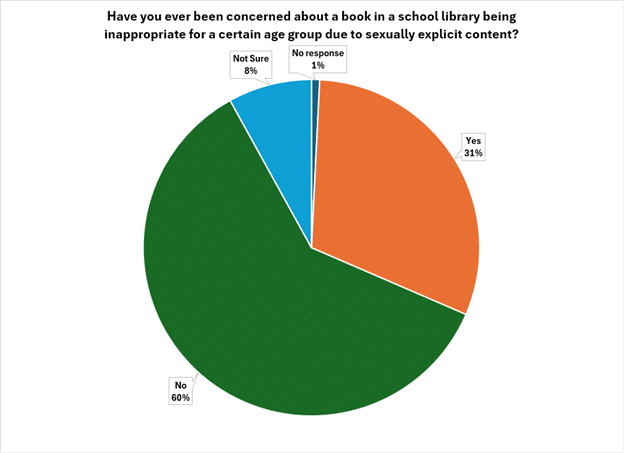
At what age should children be able to access materials with sexually explicit content in school libraires?
There is a wide diversity of opinions on this question. The plurality of respondents (34%) opine that sexually explicit materials should never be available in school libraries while only half that number (16%) think that they should be available at every grade level. The remaining respondents are somewhere in between those two positions, with 4% saying that they should be available starting in elementary school, 22% by middle school, and 23% by high school. Framing the question in this way makes it seem like the most supported action is for sexually explicit content to be entirely removed from schools.
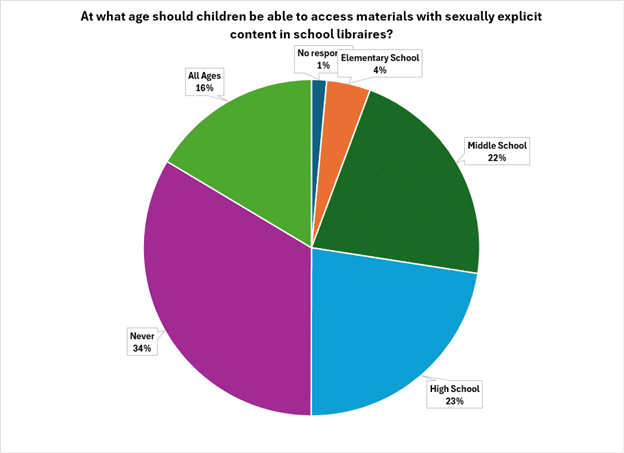
But if we add up at which point Albertans think sexually explicit material should be available (e.g. the twenty-two percent who think that such material should be available starting in middle school would also be in favour of it being available in high school), the picture looks a bit different. Looking at the question this way, a supermajority (65%) are supportive of these materials being available in high schools and 42% in middle schools.
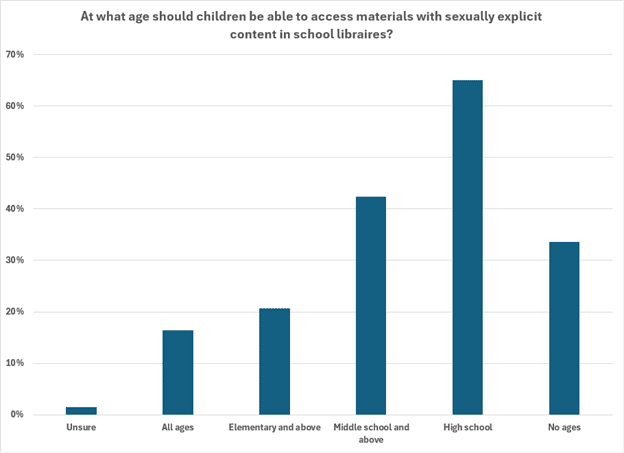
Now, the survey doesn’t break down what types of sexually explicit material they are talking about. Most parents would have few qualms of science textbooks depicting sexual organs in high schools, but far more parents would be uncomfortable with novels describing sexual activity in detail. The purpose of one set of books is educational while the purpose of the other set is to incite sexual desire.
Who do you think should decide what materials are age appropriate in school libraries?
When asked who should decide what is appropriate for school libraries, the top responses were school librarians (70%) and teachers (55%). In other words, the education “experts.” Parents came in a close third (52%). The fact that parents aren’t at the top of the list illustrate how the Christian principle that parents should have the primary responsibility over their children’s education isn’t top of mind for most Albertans. Elected school boards were also towards the bottom of the list, with only 34% of respondents opining that the school board get involved in these decisions, despite the fact that they were elected to oversee these public school districts.
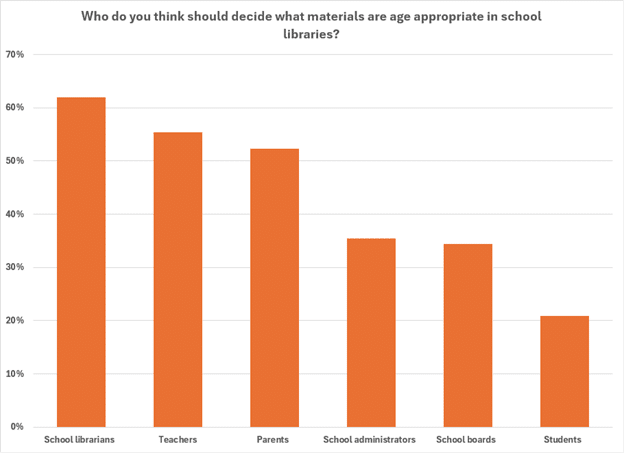
Given the range of actors that survey respondents want to be involved (or not involved) in determining when and where sexually explicit materials should be in school libraries, it is hardly surprising that there isn’t a clear consensus on what should be done.
How do you think school libraries should handle materials with sexually explicit content?
The most common response to this question was for school librarians to restrict access based on age/grade level (41%). Essentially, respondents – who already stated that school librarians should have the most control over what sexually explicit material is available – tend to want to give them the discretion to determine what is appropriate. Nevertheless, a sizeable percentage (29%) think that public school librarians should entirely remove this content from their shelves. This percentage is only slightly less than the percentage of people (34%) who think that, in general, this content should not be available to students at all.
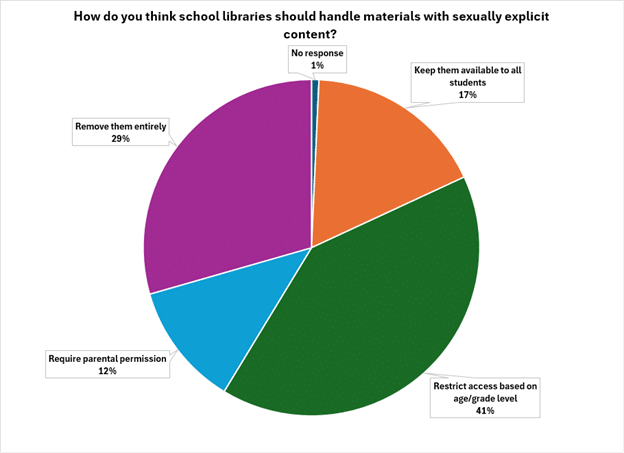
Parental involvement and consent relating to sexually explicit material
Two questions dealt with how far parents should be involved in this issue. A majority (62%) agree that parents should play a role in reporting or challenging the availability of sexually explicit content in school libraries (compared to 34% who disagree). But this doesn’t seem to be an endorsement of parents actually having any power over the availability of these materials. Implementing the policy as worded in the survey would probably give parents the opportunity to ask school librarians or school trustees to review certain materials that they think are inappropriate but leave the final decision in their hands.
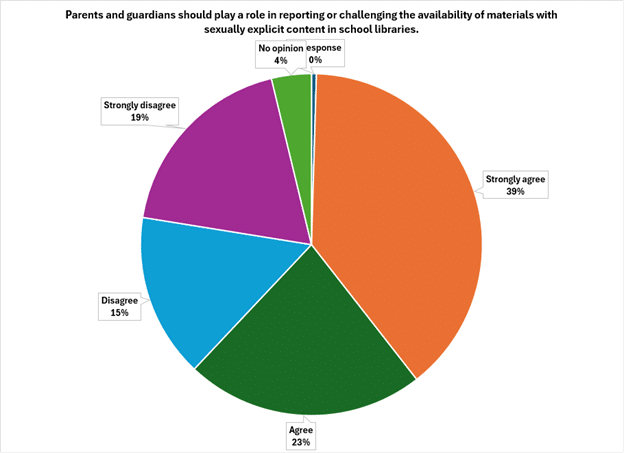
When asked if parental consent should be required for children to access sexually explicit content in school libraries, respondents were sharply divided. Fifty-one percent disagreed that parental consent should not be required while 44% agree that they should.
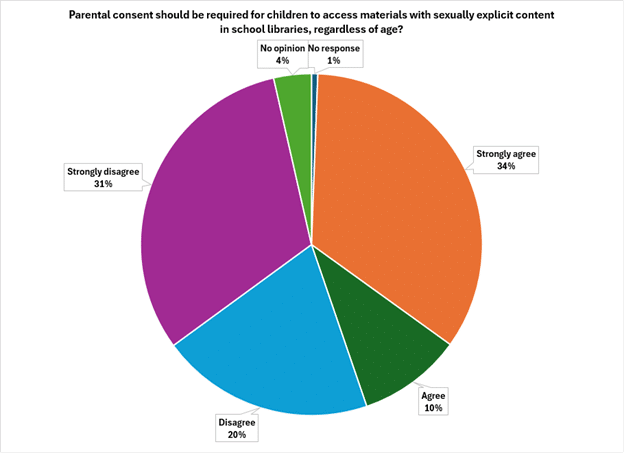
Taken altogether, the results of this survey reveal only half-hearted support for parents to play a substantial role in determining what content should be available in public schools.
How supportive are you of the Government of Alberta setting consistent requirements for school boards in how they select and manage school library materials?
And finally, one question surveyed Albertans on what the provincial government should do. (This was really the point of the entire survey.) If the provincial government was looking for a clear mandate to regulate books in school libraries, they didn’t get it. A majority of Albertans (55%) are not supportive of the provincial government stepping into this issue, with a full 46% being not at all supportive. Only 39% wanted the provincial government to intervene. Despite these results, the province has announced that they will indeed bring in provincial guidelines for public school library books.
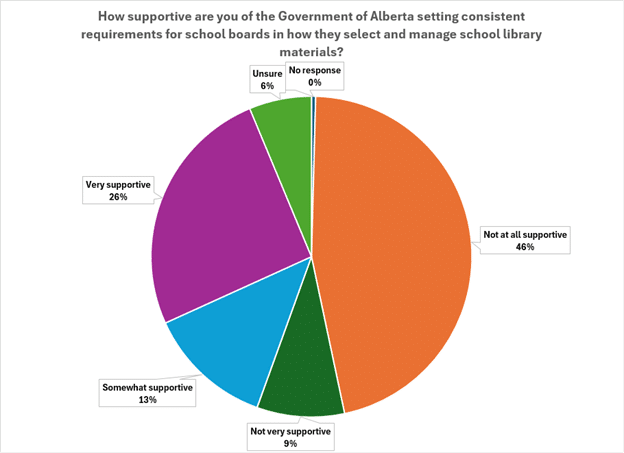
Conclusion
Like the survey respondents, Reformed Christians might have conflicting thoughts on the role of the provincial government in this matter. If we truly believe that parents should be the ones directing the education of their children, it doesn’t really make sense for the provincial government to mandate what should or should not be available in public school libraries. Parents should have that power, perhaps through existing parent advisory councils.
Unfortunately, public schools are far from parent led. If we really wanted to entrench the right and responsibility of parents in matters of education, far more systematic change would be required. For example, allowing only parents whose children are enrolled in a given public school district to vote in school board elections and empowering that parent-elected board to have far more control over the school or school district would be two transformative steps.
But that’s not the system of public education that we have now. If parents lack the power to keep sexually explicit content out of public school libraries, school boards are politically afraid to take a stand, and school staff (teachers, admin, and librarians) are increasingly dominated by progressive sexual ethics, the provincial government may need to intervene.